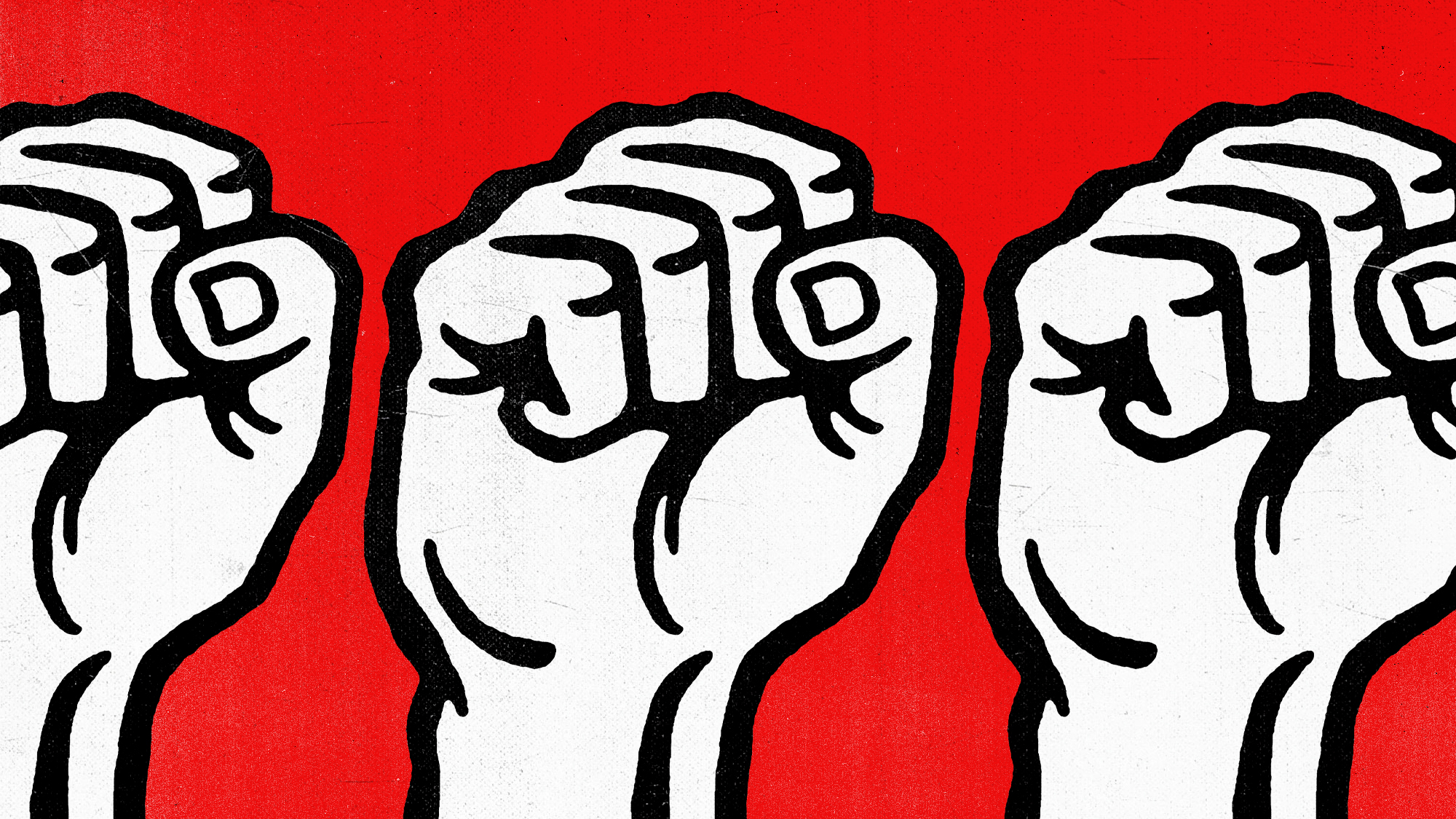2023: the year of labor strikes
Workers from Hollywood to the auto lines walked off the job this year


A free daily email with the biggest news stories of the day – and the best features from TheWeek.com
You are now subscribed
Your newsletter sign-up was successful
If the first few years of the 2020s can be defined by the shift to remote work, then the workforce of 2023 can seemingly be defined by one word: strikes. Across the United States, unions and labor movements took to the streets to demand better working conditions, more equal pay, protections against rapidly increasing tech changes and more.
There are a variety of reasons why 2023 was the year of the walkout. What started as the "summer of strikes" has expanded toward the end of 2023, and will likely continue into 2024. These are some of the most notable strikes of the year and what they accomplished for their workers:
Hollywood (SAG-AFTRA and the WGA)
The walkouts that undoubtedly generated the most coverage in 2023 were the dual strikes connected to Hollywood. Both SAG-AFTRA, which represents working actors, and the Writers Guild of America (WGA), which represents film and television screenwriters, walked off the job to demand fairer working conditions and protections against the in-roads of artificial intelligence.
The Week
Escape your echo chamber. Get the facts behind the news, plus analysis from multiple perspectives.

Sign up for The Week's Free Newsletters
From our morning news briefing to a weekly Good News Newsletter, get the best of The Week delivered directly to your inbox.
From our morning news briefing to a weekly Good News Newsletter, get the best of The Week delivered directly to your inbox.
The WGA began striking this May and was looking to even the playing field between writers and the Hollywood studios. This included demands for "better wages and a better deal on residual payments for streaming shows," Variety reported, in addition to heavy regulation on "the use of artificial intelligence in the writing process." The writers were joined two months later by SAG-AFTRA, whose key issues included economic fairness, residuals, regulating the use of artificial intelligence and alleviating the burdens of the industry-wide shift to self-taping."
The strikes led to a months-long stalemate between the unions and the AMPTP — which represents the major Hollywood studios — that brought the entertainment industry to a near-standstill. The WGA reached an agreement with the AMPTP in September to end its strike, followed by SAG-AFTRA coming to terms in November. Both deals included protections against AI usage in studio projects and also wage hikes for writers. Overall the strikes led to "an estimated $7 billion in economic damage," the Los Angeles Times reported.
United Auto Workers
While Hollywood's dual strikes may have been the most publicized, the walkout from the United Auto Workers (UAW) was likely the most consequential. Workers across the UAW spectrum began picketing in September against the "Big Three" American automakers: General Motors, Ford and Stellantis. This marked the first-ever trilateral strike targeting all three companies.
UAW, which represents the auto industry's frontline factory workers, was seeking a number of improvements to its employees' standards of living. The most notable was a demand for "wage increases of around 40% to cost-of-living protections," NPR reported, which the union said represented "a long-overdue redressal for all the concessions the union made to prop up the automakers just before and after the 2008 recession." There was also anger at the growing wealth disparity between employees and the Big Three's CEOs — the head of Stellantis, Carlos Tavares, reportedly makes 298 times what his average employee does.
A free daily email with the biggest news stories of the day – and the best features from TheWeek.com
Thousands of plants came to a halt as factory workers throughout the Midwest walked out, leaving the auto industry in a perilous state. This was rectified by the end of October when the UAW reached new deals with all three automakers. The deals were described by The New York Times as the industry's "largest wage and benefit increases in decades" and could go a long way toward the reinvigoration of labor stoppages in the future.
Healthcare workers
Healthcare workers, including nurses, pharmaceutical employees and hospital staff all walked off the job this year in one of the biggest industry pickets ever. There were at least 27 healthcare industry strikes in 2023, according to Becker's Hospital Review. Most of the striking employees were seeking increases in pay and additional staffing during peak work hours.
The most notable of these disputes was a walkout at Kaiser Permanente that became the largest healthcare labor crisis in U.S. history. Thousands of workers at the California-based health conglomerate picketed this October. A deal was reached with the company on Oct. 14, with a new contract that "aims to address staffing shortages with raises that will amount to 21% in wage increases over the next four years, to help retain current workers," NPR reported.
Other healthcare industry walkouts in 2023 included a November strike of "more than 2,400 nurses at three HCA Healthcare hospitals in Southern California," according to Becker's, as well as a walkout over staffing shortages at CVS pharmacies in Kansas City, Missouri.
Justin Klawans has worked as a staff writer at The Week since 2022. He began his career covering local news before joining Newsweek as a breaking news reporter, where he wrote about politics, national and global affairs, business, crime, sports, film, television and other news. Justin has also freelanced for outlets including Collider and United Press International.
-
 Political cartoons for February 17
Political cartoons for February 17Cartoons Tuesday’s political cartoons include a refreshing spritz of Pam, winter events, and more
-
 Alexei Navalny and Russia’s history of poisonings
Alexei Navalny and Russia’s history of poisoningsThe Explainer ‘Precise’ and ‘deniable’, the Kremlin’s use of poison to silence critics has become a ’geopolitical signature flourish’
-
 Are Hollywood ‘showmances’ losing their shine?
Are Hollywood ‘showmances’ losing their shine?In The Spotlight Teasing real-life romance between movie leads is an old Tinseltown publicity trick but modern audiences may have had enough
-
 Companies are increasingly AI washing
Companies are increasingly AI washingThe explainer Imaginary technology is taking jobs
-
 Lucasfilm passes ‘Star Wars’ torch to new leaders
Lucasfilm passes ‘Star Wars’ torch to new leadersSpeed Read Kathleen Kennedy is stepping down after 14 years at the company
-
 Buffett: The end of a golden era for Berkshire Hathaway
Buffett: The end of a golden era for Berkshire HathawayFeature After 60 years, the Oracle of Omaha retires
-
 Why is pizza in decline?
Why is pizza in decline?In the Spotlight The humble pie is getting humbler
-
 Ski town strikers fight rising cost of living
Ski town strikers fight rising cost of livingThe Explainer Telluride is the latest ski resort experiencing a patroller strike
-
 How prediction markets have spread to politics
How prediction markets have spread to politicsThe explainer Everything’s a gamble
-
 What will the US economy look like in 2026?
What will the US economy look like in 2026?Today’s Big Question Wall Street is bullish, but uncertain
-
 Tariffs have American whiskey distillers on the rocks
Tariffs have American whiskey distillers on the rocksIn the Spotlight Jim Beam is the latest brand to feel the pain
